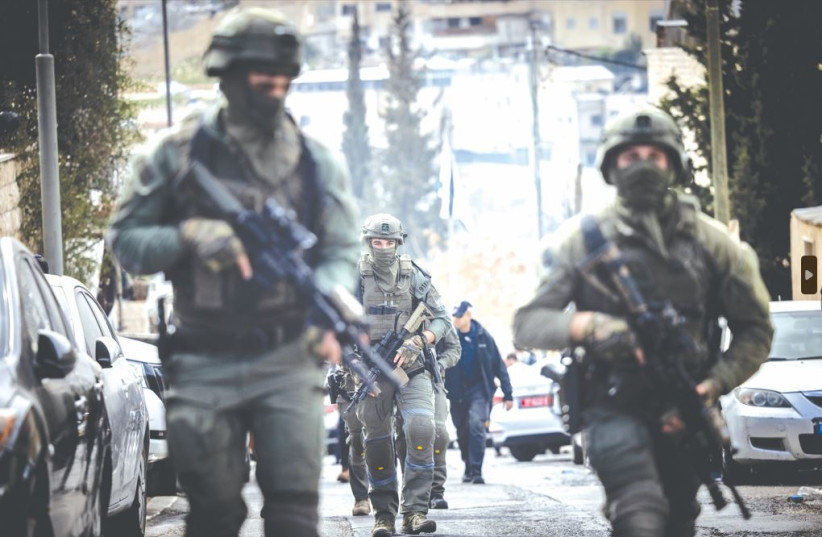The latest brutal terrorist attack near Eli serves as a grim reminder of the urgent necessity for the State of Israel to authorize a military operation in northern Samaria. Despite the ongoing proactive efforts of the IDF, particularly under the so-called military operation named Break the Wave, the wave of terrorism that has plagued the region for nearly two years remains unabated. Since its inception in March 2022, this operation has failed to significantly curb the terrorist attacks originating from northern Samaria.
Furthermore, the attempt to entrust the Palestinian Authority with the responsibility of restoring order in these areas has proven to be a bitter disappointment. The PA’s authority lacks the necessary strength to enforce its rule and disturbingly, some members of the Palestinian security apparatus have been implicated and even involved in these attacks.
Meanwhile, terrorist organizations based in Jenin and Nablus maintain control over the region, growing in influence, arming themselves and organizing their activities. Their actions are fueled by financial and moral support from Hamas and the Islamic Jihad in the Gaza Strip.
The situation in northern Samaria is not inevitable. While it is true that terrorism in Judea and Samaria against Jews is expected to persist in the foreseeable future, a significant reduction is still possible.
It is worth noting that relative calm was maintained in the region until the beginning of 2022, largely due to the effectiveness of Operation Defensive Shield and the continuous and intensive military efforts of the IDF in the area over the years.

The deterioration of the security situation in the region began when the IDF significantly scaled back its routine operational activities in northern Samaria.
This reduction was a consequence of the PA’s decision to halt security coordination with Israel in February 2020, following the unveiling of the “deal of the century” by the Trump administration. This trend continued even after security coordination between the parties was restored, resulting in approximately a year and a half of limited IDF operational presence in the region and a corresponding strengthening of Islamic Jihad, Hamas, and other terrorist organizations.
At this juncture, it is crucial to explore alternative approaches to curbing terrorist activities and restoring relative calm to the region.
To stop terrorism in the West Bank, Israel needs an offensive and decisive strategy
To achieve this, Israel must transition from a strategy of deterrence and thwarting to a more offensive and decisive stance in Judea and Samaria. This can involve escalating pressure and intensifying efforts against terrorist organizations in Nablus and Jenin through surgical and limited military operations in these cities, at least as an initial phase.
A military operation should have a strategic focus on targeting the enemy’s core elements, including the elimination of terrorists and the destruction of their military and organizational infrastructure. By doing so, the operation will exert immense pressure on the terrorist organizations and infrastructure, prevent their reorganization, and eradicate the strongholds of terrorism in the area.
Israel should prioritize targeted aerial assassinations during the operation, while ground forces of the IDF will engage in activities that provoke terrorists to expose themselves. This can involve the use of UAVs and drone swarm, combat helicopters and shoulder-fired missiles to engage the enemy, supported by real-time situational and intelligence mapping.
The duration of the operation is likely to span several weeks to months, depending on initial results, the extent of the operational area, and the depth of IDF involvement. It is essential to acknowledge the significant risk posed to the lives of participating soldiers. However, it should be remembered that soldiers are meant to protect civilians, not the other way around.
A limited and focused military operation in northern Samaria should not excessively divert attention or necessary resources from countering Iran’s nuclear program or addressing ongoing Iranian entrenchment in Syria.
In addition, it can be assumed that the military operation will not trigger an intifada or widespread civil unrest among the Palestinian residents of Judea and Samaria. This is due to the operation’s limited scope, concentrated in specific areas such as Nablus and Jenin. Most Palestinians in Judea and Samaria will be able to move freely without restrictions.
Simultaneously, Israel must engage in prior coordination with Washington to secure legitimacy for the military operation.
This is particularly important considering past statements by senior officials in the American administration that wrongly attribute blame to “both sides” during the current wave of terrorism faced by Israel.
Israel must ensure that the Biden administration comprehends the operation’s significance as a last resort after exhausting all other options.
Diplomatic efforts should also be pursued with Gulf countries, partners involved in the Abraham Accords and even with Turkey.
The writer has a PhD in Political Studies. He is a military strategy and national security expert and a researcher at the Jerusalem Institute for Strategy and Security (JISS) and the Israel Defense and Security Forum (Habithonistim).
